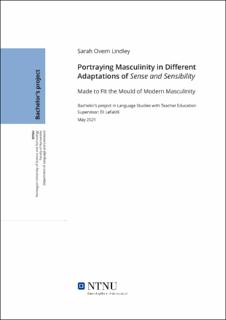| dc.contributor.advisor | Løfaldli, Eli | |
| dc.contributor.author | Lindley, Sarah Overn | |
| dc.date.accessioned | 2021-09-24T18:37:48Z | |
| dc.date.available | 2021-09-24T18:37:48Z | |
| dc.date.issued | 2021 | |
| dc.identifier | no.ntnu:inspera:77723451:38057609 | |
| dc.identifier.uri | https://hdl.handle.net/11250/2782055 | |
| dc.description.abstract | Denne oppgaven analyserer og diskuterer hvordan de mannlige karakterene i Jane Austens Sense and Sensibility er tilpasset moderne maskulinitetsideal på film. Filmene Sense and Sensibility og From Prada to Nada er adapsjoner av Austens bok, men har på hver sin måte blitt oppdatert til å passe et samtidspublikum. Å vedlikeholde en god offentlig framstilling, en solid arbeidsetikk, og et stabilt familieliv er tre av hovedfaktorene som spiller inn i en ideell maskulinitet. Hvordan de tre mannlige hovedkarakterene, Edward Ferrars, Colonel Brandon og John Willoughby, representerer disse standardene i boken og de to filmene viser at mens Austen fokuserte på å skape allsidige og realisitske portrett, antar romantiske komedie filmer at det er et kvinnelig publikum. På grunn av dette har måten maskulinitet blir framstilt på reflektert en ideell maskulinitet, som prioriterer å tilfredsstille publikum mer enn å skape realistiske fremstillinger. | |
| dc.description.abstract | This thesis analyses and discusses how the male characters from Jane Austen’s Sense and Sensibility are made to fit the contemporary ideals of masculinity on screen. The films Sense and Sensibility and From Prada to Nada are adaptations of Austen’s book, but have, in their own way, been updated to fit the contemporary audience. Building a good public image, solid work ethic, and stable domesticity are three of the main factors that play into an ideal masculinity. Looking at how the three leading men, Edward Ferrars, Colonel Brandon and John Willoughby, represent these standards in the book and the two films shows that while Austen focused on creating well-rounded and realistic portraits, romantic comedy films assume a female audience. Because of this the way in which masculinity is portrayed on screen is seen to reflect an ideal masculinity, which prioritises pleasing the audience above creating realistic portrayals. | |
| dc.language | eng | |
| dc.publisher | NTNU | |
| dc.title | Portraying Masculinity in Different Adaptations of Sense and Sensibility | |
| dc.type | Bachelor thesis | |
